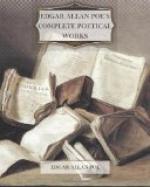Bal. Thou speakest a fearful
riddle
I
will not understand.
Pol. Yet now as Fate
Approaches,
and the Hours are breathing low,
The
sands of Time are changed to golden grains,
And
dazzle me, Baldazzar. Alas! alas!
I
cannot die, having within my heart
So
keen a relish for the beautiful
As
hath been kindled within it. Methinks the air
Is
balmier now than it was wont to be—
Rich
melodies are floating in the winds—
A
rarer loveliness bedecks the earth—
And
with a holier lustre the quiet moon
Sitteth
in Heaven.—Hist! hist! thou canst not say
Thou
hearest not now, Baldazzar?
Bal. Indeed I hear not.
Pol. Not hear it!—listen—now—listen!—the
faintest sound
And
yet the sweetest that ear ever heard!
A
lady’s voice!—and sorrow in the tone!
Baldazzar,
it oppresses me like a spell!
Again!—again!—how
solemnly it falls
Into
my heart of hearts! that eloquent voice
Surely
I never heard—yet it were well
Had
I but heard it with its thrilling tones
In
earlier days!
Bal. I myself hear it now.
Be
still!—the voice, if I mistake not greatly,
Proceeds
from younder lattice—which you may see
Very
plainly through the window—it belongs,
Does
it not? unto this palace of the Duke.
The
singer is undoubtedly beneath
The
roof of his Excellency—and perhaps
Is
even that Alessandra of whom he spoke
As
the betrothed of Castiglione,
His
son and heir.
Pol. Be still!—it comes again!
Voice
(very faintly). “And is thy heart
so strong [1]
As
for to leave me thus,
That
have loved thee so long,
In
wealth and woe among?
And
is thy heart so strong
As
for to leave me thus?
Say
nay! say nay!”
Bal. The song is English, and
I oft have heard it
In
merry England—never so plaintively—
Hist!
hist! it comes again!
Voice
(more loudly). “Is it so strong
As
for to leave me thus,
That
have loved thee so long,
In
wealth and woe among?
And
is thy heart so strong
As
for to leave me thus?
Say
nay! say nay!”




